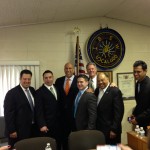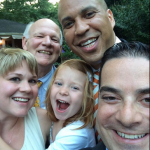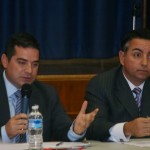Democrats Push Polling in Monmouth County
Professional pollsters call the tactic “unethical” and “fraudulent”

Senator Cory Booker and freeholder candidates Larry Luttrell and Joe Grillo have deployed a campaign tactic dubbed “unethical” and “fraudulent” by the American Association of Public Opinion Research. photo via facebook
The Democratic Party is deploying a controversial campaign tactic known as “Push Polling” in Monmouth County on behalf of Senator Cory Booker and their county freeholder candidates. MMM has received reports of such calls being delivered to unsuspecting voters in Shrewsbury, Neptune and Manalapan.
The automated calls, which do not disclose who they are being made on behalf of or who is paying for them, purport to be opinion surveys. If the voter responds that they favor Republican U.S. Senate nominee Jeff Bell rather than Booker, they are subject to a series of “If you knew” questions that distort Bell’s record and lie about his positions.
If the voter responds that they intend to vote for Monmouth County Freeholders Lillian Burry and Gary Rich for reelection, the are subject to “If you knew” questions that accuse the incumbents of unethical hiring practices, dirty dealing on Open Space acquisitions and criticizing the length of their public service in various municipal and county offices.
The American Association for Public Opinion Research (AAPOR) defines a “push poll” as a form of negative campaigning that is disguised as a political poll. “Push polls” are actually political telemarketing – telephone calls disguised as research that aim to persuade large numbers of voters and affect election outcomes, rather than measure opinions.
The call made into Manalapan was made from 732-479-4554. That number is answered by a recording that says “The number you have called is the voice mail box for our polling services. You received a call from us because you were randomly selected to participate in one of our research surveys.” “Push poll” calls are not polls or research surveys. The numbers called are not randomly selected.
Democratic freeholder candidate Joe Grillo denied any knowledge of the calls when confronted about them by MMM on Thursday evening. “Push polls?” Grillo said as if he didn’t know what they are. “You don’t know what a push poll is?” we asked the long term political operative turned candidate. “I know what push poll is, but I don’t know what you’re talking about.” When informed that the calls did not have a “paid for disclosure” as required by New Jersey’s Election Finance Laws, Grillo walked away.
AAPOR classifies this tactic as “unethical” and “fraudulent” in a statement published on the association’s website:
AAPOR STATEMENT ON “PUSH” POLLS
The problem of so-called “push polls”
When advocacy calls are made under the guise of research
June 2007
This statement from AAPOR explains how to tell the difference between fraudulent political polls—commonly referred to as “push polls”—and legitimate polling, including message testing. AAPOR condemns political telemarketing under the guise of research and is committed to providing information that explains what this unethical campaign practice is and what you can do about it.
A “Push Poll” is not a Legitimate Poll
A so-called “push poll” is an insidious form of negative campaigning, disguised as a political poll. “Push polls” are not surveys at all, but rather unethical political telemarketing — telephone calls disguised as research that aim to persuade large numbers of voters and affect election outcomes, rather than measure opinions. This misuse of the survey method exploits the trust people have in research organizations and violates the AAPOR Code of Professional Ethics and Practices.
Identifying Advocacy Calls Made Under the Guise of Research
Political telemarketing calls, when disguised as research, may sometimes be difficult to differentiate from a legitimate survey. Here are characteristics that will usually indicate to a respondent that the call is not a legitimate survey.
- One or only a few questions are asked, all about a single candidate or a single issue.
- The questions are uniformly strongly negative (or sometimes uniformly positive) descriptions of the candidate or issue.
- The organization conducting the calls is not named, or a phony name is used.
- Evasive answers are given in response to requests for more information about the survey.
In addition, the following characteristics will indicate to journalists, reporters, and survey professionals that a telephone call is not a legitimate survey.
- The number of people called is very large, sometimes many thousands.
- The calls are not based on a random sample.
- It is difficult to find out which organization conducted the interviews.
Fraudulent Polls vs. Message Testing
The fact that a poll contains negative information about one or more candidates does NOT in and of itself make it a ‘push poll.’ Political campaigns routinely sponsor legitimate “message-testing” surveys that are used by campaign consultants to test out the effectiveness of various possible campaign messages or campaign ad content, often including negative messages. Political message-testing surveys may sometimes be confused with fake polling, but they are very different. One way to tell is that message-testing surveys exhibit the characteristics of a legitimate survey, such as:
- At the beginning of the call, the interviewer clearly identifies the call center actually making the calls. (However, legitimate political polling firms will often choose not to identify the client who is sponsoring the research, be it a candidate or a political party, since that could bias the survey results.)
- The interview contains more than a few questions.
- The questions usually ask about more than one candidate or mention both sides of an issue.
- Questions, usually near the end of the interview, ask respondents to report demographic characteristics such as age, education level, and party identification.
- The survey is based on a random sample of voters.
- The number of respondents falls within the range of legitimate surveys, typically between 400 and 1500 interviews.
AAPOR stresses that these criteria apply most of the time, but exceptions will arise. Journalists and members of the public are encouraged to investigate allegations of “push polling” to ascertain whether or not the calling activity was carried out for legitimate research purposes.
The Threats of Fraudulent Political Calls (Political Telemarketing Under the Guise of Research)
Political advocacy calls made under the guise of a survey abuse the public’s trust. They gain the attention of respondents under false pretenses by taking advantage of the good will people have toward legitimate research.
When disguised as research, these calls create negative images of legitimate surveys, especially when they distort issues or candidate characteristics in order to influence opinion.
They go beyond the ethical boundaries of political polling by bombarding voters with distorted or even false statements in an effort to manufacture negative attitudes.
The hostility created in this way affects legitimate surveys by reducing the public’s willingness to cooperate with future survey requests.
AAPOR Position on So-Called “Push Polls”
- AAPOR Councils have repeatedly warned members and the public about the harm done by unethical political telemarketing that is conducted under the guise of research.
- In 2005, the AAPOR Code was amplified to identify fraudulent political polling as unethical conduct. The Code states: “We shall not misrepresent our research or conduct other activities (such as sales, fund raising, orpolitical campaigning) under the guise of conducting research” [section II.D.4, emphasis added].
- AAPOR has reacted to complaints about suspected “push polls” and conducted investigations.
- AAPOR urges its members and the media to uncover instances of political telemarketing under the guise of research and help us alert the public promptly when these fraudulent political polls occur.
The American Association of Political Consultants and the National Council on Public Polls have also issued statements condemning “push polls,” and member organizations of these associations are pledged not to conduct them.
Issues in Message Testing
Despite their legitimacy of purpose, message-testing surveys occasionally generate vigorous complaint. They are sometimes the subject of public controversy in political campaigns, and may appear in press stories about dubious campaign practices. AAPOR recognizes that message tests may need to communicate positive or negative information in strongly political terms, in a tone similar to campaign advertisements. Still, these surveys should be judged by the same ethical standards as any other poll of the public: Do they include any false or misleading statements? Do they treat the respondent with fairness and respect?
Issues with Automated Calling
New technologies for contacting people by phone, including pre-recorded political messages, automated touch-tone polls, and interactive voice response technology, all offer new opportunities for political campaigns—and new possibilities for abuse as well. The issues are the same whether a live telephone caller or an automated system makes the call. Advocacy or canvassing calls should never be misrepresented to voters as research calls, whatever the mechanism of communication.
How Can You Help Combat Fraudulent Political Polling — So-Called “Push” Polls?
AAPOR urges its members and the media to uncover unethical political telemarketing and help alert the public.
If you suspect you have received a political telemarketing call disguised as a survey, try to get as much information as possible from the caller, particularly the name and location of the organization doing the “interviewing.” Take notes on the specific questions that you were asked.
Also ask what organization is conducting the calls, the number of people called, the questions that will be included, and how the information from the call will be used.
If you are a reporter who receives information on a purported “push poll”, seek to discern if the call in question was part of a legitimate message-testing survey or was indeed political telemarketing under the guise of research. Solicit the opinions of experts who can evaluate it accordingly.









This call also was made to the editor of the News Transcript (Greater Media Publication) who lives in Freehold Township.
I did receive a push call and live in Hazlet late last week. I usually hang up, but was curious to see what it was so I participated in the call.
Now that I understand what it is, I am disturbed that they have used this tactic and will rethink who I might have voted for in the election.
You can see our efforts to help our community by offering articles, videos and photos on how to maintain and increase the value of their homes. Our town like many have residents that have given up and no longer take pride in their homes or their town.
Our mission is to bring that pride back. We have a Facebook group and fan page with thousands of LIKES in only one month and over 600 Group members.
We hope others will join our cause which is a community effort and our elected officials will also understand the importance of rebuilding the pride we all had years ago.
[…] Democrats’ campaign is not only fraudulent phone calls, defaming good county employees, and lying about the ethics of distinguished public servants. […]
MCRC- these polls may be underhanded and based on untruths and negativity, but, as we know, negative does work.. and, we need to be concerned that someone was willing to spend money on the two unknown lightweights trying to wedge themselves into Freehold..can’t let up, if we want to save the two seats, and make a dent into Booker, in Monmouth.
I got a call yesterday, I had no idea Jeff Bell was the architect of the “Tea Party Stratagy” or that he hated woman and minority’s or that he was going to end Medicare and bring about nuclear annihilation (ok, I made up that last one). I’m so glad that the poll wanted to know if I was black or Hispanic, I selected other. These next few weeks should be interesting.
Actually, this push poll was disclosed, but only at the very end, as being paid for by the Monmouth County Democratic Party.
It was an obvious push poll, disguised as a voter survey, but they were stupid to call my family …..I now have their phone number and will block further calls.
Their phone number is 732-479-4554 and they are claiming this is a “random survey” on their answering machine.
It did sound like they were trying to get people to vote for at least one Dem based on their attack on Lillian Burry and allegations of “corruption” in Freehold.
I’ve been away from yeo old Gallagher’s blog for way too much time.
Is this the only strategy the wascally liberals have? Attack a county employee, re run old issues and smear Republican candidates?
Signed,
Silence Dogood, Redux
[…] Freeholder Director Lillian Burry submitted this column back in February. In light of the recent “push polling” negative campaign tactic on the part of the Monmouth County Democrats and what looks to be an ugly […]
(732) 479-4554 Level3 VoIP in South Amboy, NJ
Moderate spam activity suspected.
link: http://www.whitepages.com/phone/1-732-479-4554
hmmm..Middlesex County democrats getting involved?
Yes, it’s Ocean County, but it seems the Democrats are pulling the same kind of negative smear campaign against Tom McArthur. This one is orchestrated by something called The House Majority PAC.
First, it’s wishful thinking, second; it is devious. The Republicans are in the Majority, yet one would think the Majority authored this attack against one of their own.
Sick and sad.
In middletown, I answer. Started off like a real poll although I knew it was way to early for this! So I played along, I answered questions.
The best part was when they got to the issue of the nursing homes and they were so ambiguous tgat I had to listen to the question again. The democrats just let the entire county know they have yet to take a position on the nursing homes and will just go opposite whatever the freeholder board does!
If they choose to keep them open- “oh the financial implications”
If they close them- “oh the poor patients and workers”
Is unlisted and I still got this survey!!!!
It was fun I must admit to answer all questions NOT TO THEIR LIKING…..LOL
Go Republicans!
A diversion effort by the Republicans away from the real issues and their sad record.
It shows they can’t run on their record
Hogwash Gary. They are running on there record, which is excellent.
Your guys are the ones doing the diverting. What will the Dems do to improve Monmouth County?
BTW, why did you pull out of your race in Wall Township?
Hogwash 2 Gary.
The push poll is an attempt to demonize and play a game of smoke and mirrors because the Democrats have NOTHING to run on.
[…] people in Monmouth County, N.J. reported getting the calls, as first reported by MonmouthMusings.com, a local website. The call indicated it was a random opinion poll, and voters […]
[…] people in Monmouth County, N.J. reported getting the calls, as first reported by MonmouthMusings.com, a local website. The call indicated it was a random opinion poll, and voters […]